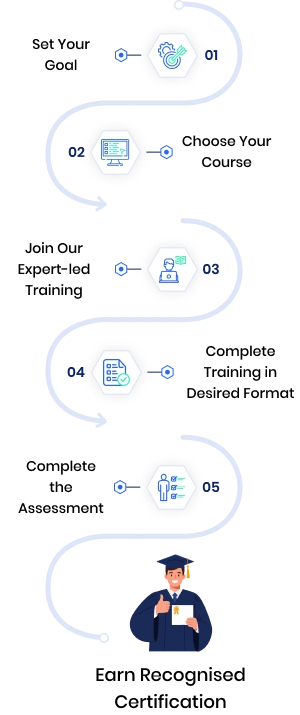Course Overview O v e r v i e w
- Course Overview
- Course Outline
- What’s Included
- What You’ll Learn
- Exam Details
ISO 22301 Lead Auditor Overview
The ISO 22301 Lead Auditor Course provides a comprehensive understanding of Business Continuity Management Systems (BCMS) and auditing best practices. It equips professionals with the knowledge to assess compliance, identify risks, and evaluate the effectiveness of continuity processes. Learners gain expertise to conduct ISO 22301 audits effectively.
Being formally trained as an ISO 22301 Lead Auditor enhances professional credibility and career prospects in risk, compliance, and quality management. It enables professionals to audit independently and strengthen organisational resilience and continuity. Certified professionals are recognised for their ability to strengthen crisis response frameworks and protect critical operations.
At Training Deals, learners benefit from accredited instructors, real-world case studies, and hands-on audit simulations that reinforce practical skills. The course is available in flexible online and classroom formats, supported by expert guidance and exam-focused preparation materials. With Training Deals, professionals gain the confidence and capability to lead effective ISO 22301 audits and help organisations maintain operational stability under any circumstances.

ISO 22301 Lead Auditor Outline
Module 1: Introduction to Business Continuity Management Systems
What is a BCMS?
Scope of a BCMS
Management Systems
BCM System Process
Business Continuity Management (BCM)
BCMS Benefits
Business Continuity Management Lifecycle
Applicability and Objectives
Module 2: Fundamental Principles and Concepts of Business Continuity
Fundamental Principles
Build a Comprehensive Plan
Implement Each Step of the Action Plan
Check and Evaluate Results
Review and Make Improvements
Business Continuity
Module 3: Clauses 4 to 8 of ISO 22301
Introduction
Clauses of ISO 22301
Clause 4 – Context of the Organisation
Clause 5 – Leadership
Clause 6 – Planning
Clause 7 – Support
Clause 8 – Operations
Module 4: Overview of ISO 22301 Standard
Introduction to ISO 22301
22301 Standard Progression
22301 High-level Methodology
Implementation Cycle Times
Module 5: BCM Mandatory Documents
Clause 4.2.2
Clause 4.3
Clause 5.3
Clause 6.2
Clause 7.2
Clause 7.4
Clause 8.2.1
Clause 8.2.2
Clause 8.2.3
Clause 8.4.1
Clause 8.4.2
Clause 8.4.3
Clause 8.4.4
Clause 8.4.5
Clause 9.1.1
Clause 9.3
Clause 10.1
Module 6: Leadership
Leadership and Commitment
Establishing the Business Continuity Policy
Communicating the Business Continuity Policy
Module 7: Management Roles and Responsibilities
Overview
Impediments to Success
Aids to Success
Module 8: Implementation Phases of the ISO 22301 Framework
Management Support
Identification of Requirements
Business Continuity Policy and Objectives
Support Documents for Management System
Risk Assessment and Treatment
Business Impact Analysis
Business Continuity Strategy
Business Continuity Plan
Training and Awareness
Documentation Maintenance
Exercising and Testing
Post-Incident Reviews
Communication with Interested Parties
Measurement and Evaluation
Internal Audit
Corrective Actions
Management Review
Module 9: Continual Improvement of a BCMS
Continual Improvement
BCMS Control System
Areas of Continual Improvement
Module 10: Audit and Auditing Principles
Introduction to Audit
Fundamental Principles of Auditing
Scope of Auditing
PDCA Cycle
Module 11: Auditing Roles
What are the Roles?
Organisational Context
Management Responsibilities
Planning, Support, and Operation
Performance Evaluation
Improvement
Module 12: Roles and Responsibilities of the Auditor
Internal Auditing
Roles and Responsibilities
Typical Internal Audit
Module 13: Skills of an Internal Auditor
Internal Auditing Goals
Qualities of an Auditor
Auditing Skills
Module 14: Purpose of Internal Auditing
22301 Mission
Key Benefits of BCMS
Module 15: Audit Procedures
BCMS Audit Process
Elements of an Internal Audit
Internal Audit Process
Required Documentation
Supporting Procedural Documentation
Required Records and Documentation
Module 16: Audit Triangle
Fraud Triangle
Tackling the Fraud Triangle
Module 17: Auditing Techniques
Classifying Audit Findings
On-Site Auditing
Remote Auditing Methods
Module 18: Work Document Approach
Steps to Certification
Certification Audits
Module 19: Business Continuity Control Best Practice
Overview
BCM Policy
Management Commitment
Plan How to Deal with an Emergency
Impediments to Success
Disaster Recovery
Module 20: Planning a Business Continuity Management System (BCMS)
Planning a BCMS
Module 21: Implementation of Business Continuity and Writing Procedures
Communication
Writing a Scenario
Delivering the Scenario
Module 22: Business Impact Analysis (BIA) and Risk Assessment
Business Impact Analysis
Risk Assessment
Risk Assessment Methodologies and Implementation
Risk Treatment Implementation
Module 23: Incident Management and Emergency Management
Overview
Incident Management
Emergency Management
Key Elements of Crisis Management Respond Process
Module 24: Operations Management of a BCMS
Introduction to Operations Management of a BCMS
Module 25: Business Continuity Strategies and Solutions
General
Identification of Strategies and Solutions
Selection of Strategies and Solutions
Resource Requirements
Implementation of Solutions
Module 26: Business Continuity Plans and Procedures
General
Response Structure
Warning and Communication
Business Continuity Plans
Recovery
Evaluation of Business Continuity Documentation and Capabilities
Module 27: Performance Evaluation, Monitoring, and Measurement of a BCMS
Performance Evaluation, Monitoring, and Measurement of a BCMS
Key Performance Indicators (KPI)
Identifying Indicators of an Organisation
Critical Success Factors (CSFs)
Writing an Effective Critical Success Factor
CSFs for Strategic Planning
Performance Evaluation
Case Study: Telefonica
Cutting Complexity
Taking Actions
Module 28: Development of Metrics, Performance Indicators, and Dashboards
Development of Metrics
KPI Dashboards
Steps to Create KPI Dashboards
Module 29: Internal Audit and Management Review of a BCMS
Internal Audit
Introduction to Management Review
Purpose of Management Review
Management Review Input
Management Review Outputs
Module 30: Improvement and Implementation of a Continual Improvement Program
Nonconformity and Corrective Action
Continual Improvement
Lifelong Learning
Tone from the Top
Let’s have a Plan
Second Opinion
Catching up
Takeaway
Module 31: Preparing for a BCMS Certification Audit
BCMS Certification Audit
Choose a Certification Body
Certification Audits
Surveillance Visits
Module 32: Development of a BCMS and Business Continuity Policies
Development of a BCMS
Steps for Development of a BCMS
Business Continuity Policies
Module 33: Purpose of Management Review
Conducting an Audit
Core Audit Principles and Concepts
Evidence and Risk
Preparation of an Audit
BCMS Documentation Audit
Opening Meeting
Module 34: Directing an ISO 22301 Audit
Communication During the Audit
Audit Actions
Findings from the Audit
Components of the Documentation
Supporting Procedural Documentation
Closing Meeting
Assessing Corrective Action Plans
ISO 22301 Surveillance Audit
Internal Audit Management Programme
Second Party Audits
Module 35: Manage Auditing Teams, Improve Analysing, and Reporting Skills
Introduction
Management Audit Procedure
Improvement Analysing
Data Analyses
Root Cause Analysis
Reporting Skills

What’s included in this ISO 22301 Lead Auditor?
- Expert-led Training Sessions by Certified Instructors
- ISO 22301 Lead Auditor Exam
- Digital Delegate Pack
What You’ll Learn in this Course
This course takes you from understanding the fundamentals of Business Continuity Management Systems (BCMS) to applying structured auditing practices in real-world organisational settings. Each stage builds the knowledge and confidence needed to assess, monitor, and improve business continuity frameworks effectively.
Learn the core principles and framework of ISO 22301 auditing
Learn to plan, conduct, and manage internal and external BCMS audits
Learn to identify nonconformities and recommend effective corrective actions
Learn to apply ISO 22301 requirements across varied organisational contexts
Learn to evaluate and improve business continuity performance and compliance
Learn to ensure organisational resilience and preparedness during disruptions

ISO 22301 Lead Auditor Exam Information
To achieve the ISO 22301 Lead Auditor, candidates will need to sit for an examination. The exam format is as follows:
Question Type: Multiple Choice
Total Questions: 30
Total Marks: 30 Marks
Pass Mark: 50%, or 15/30 Marks
Duration: 40 Minutes
Type: Closed Book

Our Upcoming Batches
No schedules available.
No data available
No schedules available.
Request More Information

Corporate Training
Elevate your workforce with expert-led corporate training that enhances skills, boosts productivity, and aligns teams with your business goals.

Individuals Training
Unlock personal growth and sharpen professional skills with tailored training designed to build your confidence and career success.
Your Path to Professional Recognition
Our path is designed to guide you through each stage with clarity, support and practical learning, helping you achieve your goals with confidence.

Step Forward with Globally Recognised Certification
A recognised certification is more than a credential. It’s proof of your commitment to professional excellence, providing you with the credibility, confidence, and global reach to advance your career in exciting new directions.
Globally Certified Professionals Over Time
Career Growth
81%Certified professionals reported receiving a promotion after earning their certification.
Global Opportunities
89%Certified professionals experienced access to new career opportunities, including leadership roles and global positions.
Not able to find what you are looking for
Our experts will guide you to the right course from thousands worldwide: tailored to your goals.
Frequently Asked Questions
The ISO 22301 Lead Auditor Course provides the knowledge and skills to assess, audit, and improve Business Continuity Management Systems (BCMS). It prepares professionals to conduct audits in line with ISO 22301 standards and ensure organisational resilience.
This course is ideal for auditors, compliance officers, risk managers, and professionals responsible for business continuity. It’s also suitable for anyone seeking to perform independent audits or lead certification assessments for ISO 22301.
Earning this certification enhances your ability to evaluate BCMS performance, ensure compliance, and strengthen organisational preparedness. It boosts career prospects in auditing, governance, and risk management across various industries.
There are no strict prerequisites, but prior knowledge of ISO 22301 principles or completion of the ISO 22301 Foundation Course is recommended. Experience in auditing or business continuity management is also beneficial.
The course covers ISO 22301 requirements, audit planning, risk assessment, reporting, and continual improvement. Learners gain practical experience through audit simulations, case studies, and exercises aligned with real-world business continuity practices.
What Our Customers Say About Us
 Matthew Sullivan
HR Business Partner
Matthew Sullivan
HR Business Partner
Our HR team registered for the Change Management Foundation & Practitioner Training Course, and it couldn’t have been more valuable. The team gained practical frameworks to guide employees smoothly through transitions with confidence.
 Olivia Barrett
Operations Manager
Olivia Barrett
Operations Manager
Our operations staff completed the Lean Six Sigma Green Belt Training Course, and it has been transformative. We can now identify inefficiencies quickly, and the tools we learned are already improving performance across the team.
 Benjamin Foster
Product Manager
Benjamin Foster
Product Manager
Our product team took part in the Agile Project Management Foundation & Practitioner (AgilePM®) Training Course, and the difference is remarkable. We’re now more adaptive, collaborative, and efficient in managing change.
 Lucy Harper
IT Support Lead
Lucy Harper
IT Support Lead
Our IT support unit attended the ITIL® 4 Foundation Training Course, and the results have been impressive. Processes are smoother, collaboration has improved, and the team finally speaks a common language of service management.
 Edward Clarke
Programme Manager
Edward Clarke
Programme Manager
We joined the PMP® Certification Training Course as a leadership group, and it was outstanding. The trainer made every concept practical, and the exam preparation resources helped the whole team feel ready to tackle complex projects.
 Amelia Rhodes
Project Officer
Amelia Rhodes
Project Officer
Our project office completed the PRINCE2® Foundation & Practitioner Training Course, and it has brought real clarity to how we manage projects. The trainer’s examples were excellent, and the team now follows a structured approach with confidence.

























